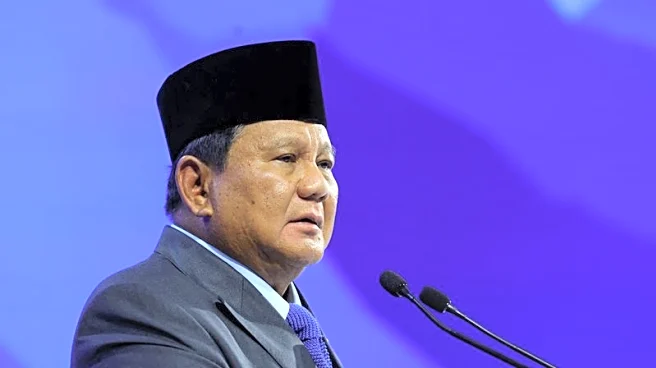What is the story about?
What's Happening?
The Trump administration is preparing to announce a significant bailout plan for U.S. farmers affected by ongoing trade disputes and large harvests. The plan, expected to be unveiled as soon as Tuesday, could involve an initial outlay of up to $15 billion. This initiative aims to support farmers, particularly those impacted by China's reduced soybean purchases due to retaliatory tariffs. The announcement comes amid a government shutdown, which complicates the approval process for such a large payout. Republican lawmakers have expressed concern over the financial challenges facing farmers, urging for aid before the year's end. Treasury Secretary Scott Bessent indicated that the White House would announce the aid package soon, with sources suggesting it could serve as a bridge through the harvest months.
Why It's Important?
The bailout plan is crucial for U.S. farmers who have been hit hard by trade tensions, particularly with China, which has significantly reduced its soybean imports from the U.S. The financial aid is intended to mitigate the economic impact of these trade disputes and ensure farmers can sustain their operations during challenging times. The plan highlights the administration's commitment to supporting the agricultural sector, which is vital for the U.S. economy. However, the government shutdown poses a significant hurdle, as Congressional approval is necessary for such a large financial package. The situation underscores the broader economic implications of trade policies and the need for effective government intervention to support affected industries.
What's Next?
The administration's plan to use tariff income for farmer aid faces statutory limitations, with direct payments capped at $350 million unless adjusted by Congress. The ongoing government shutdown complicates this adjustment process. Another potential funding source is the Commodity Credit Corporation, but its funds have not been replenished due to the shutdown. The administration may need to explore alternative funding mechanisms or seek Congressional action once the government reopens. The outcome of these efforts will significantly impact the agricultural sector and could influence future trade negotiations and policies.
Beyond the Headlines
The bailout plan raises questions about the long-term sustainability of using government funds to support industries affected by trade disputes. It also highlights the ethical considerations of prioritizing certain sectors over others and the potential precedent set for future government interventions. The reliance on tariff income for funding farmer aid may also prompt discussions on the effectiveness and fairness of such measures, considering the broader economic impact of tariffs on various industries.















